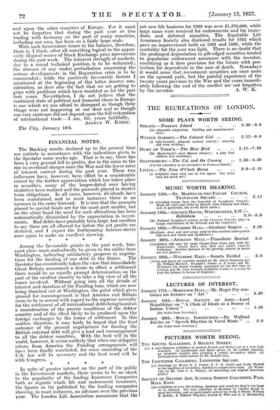FINANCIAL NOTES.
The Banking results declared up to the present time are entirely in accordance with the indications given in the Spectator some weeks ago. That is to say, there has been a very general fall in profits, due in the main to the rise in overhead charges since the War and the lower rates of interest current during the past year. These two influences have, however, been offset to a considerable extent by the further appreciation which has taken place in securities, many of the longer-dated ones having doubtless been realized and the proceeds placed in shorter term obligations. In all cases, however, dividends have been maintained, and in most instances there is an increase in the carry forward. It is true that the amounts placed to special funds are for the most part smaller, but on the other hand the need for such allocations has been automatically diminished by the appreciation in invest- ments. Bad debts have probably been large, but needless to say these are all allowed for before the net profits are declared, and I expect the forthcoming balance-sheets once again to make an excellent showing. • • * Among the favourable points in the past week, fore- most place must undoubtedly be given to the cables from Washington, indicating satisfactory progress in negotia- tions for the funding of our debt to the States. The Spectator has consistently taken the view that immediately Great Britain announced a desire to effect a settlement there would be an equally prompt determination on the part of the creditor country to take a big view of all the issues involved. Without going into all the details of interest and duration of the Funding loan, which are now being thrashed out at Washington, the point which gives ground for encouragement is that America and Britain seem to be in accord with regard to the supreme necessity for the settlement of all international debts being based on a consideration of the precise conditions of the debtor country and of the effect likely to be produced upon the foreign exchanges by the terms of settlement. In this matter, therefore, it may fairly be hoped that the final outcome of the present negotiations for funding the British external debt will give a lead and encouragement to all the debtor countries. With the best will in the world, however, it seems unlikely that when our delegates return from America the Funding arrangements will have been finally concluded, for some amending of the -U.S. law will be necessary and the final word will be with Congress.
In spite of greater interest on the part of the public in the Investment markets, there seems to be no check to the popularity of the leading Insurance Companies both as regards whole life and endowment insurance, the figures so far published by the leading companies showing, in most instances, an advance over the previous year. The London Life Association announces that the net new life business for 1922 was over £1,570,000, while large sums were received for endowments and for imme- diate and deferred annuities. The Equitable Life Assurance Society also disclosed results for 1922 which gave an improvement both on 1921 and 1920, while the mortality for the year was light. There is no doubt that the prolonged depreciation in gilt-edged securities tended to popularize endowment assurance with the investor, combining as it does provision for the future with pro- tection for dependents in the case of death. Nowadays it would seem that investment securities are once more on the upward path, but the painful experience of the twenty years previous to the War and the years immedi- ately following the end of the conflict are not forgotten














































 Previous page
Previous page